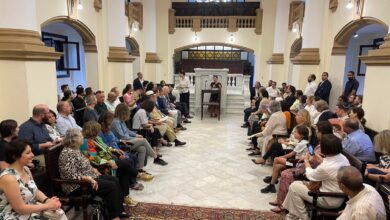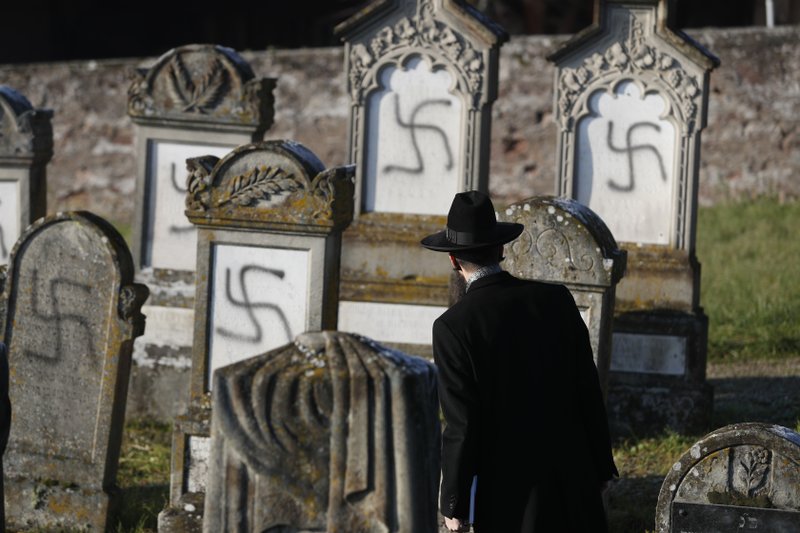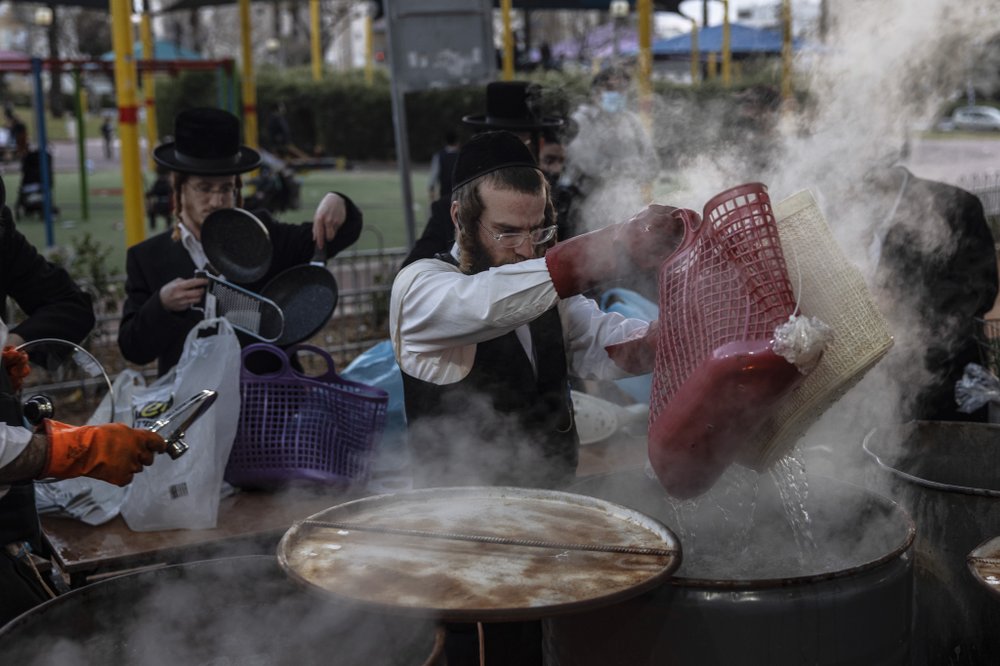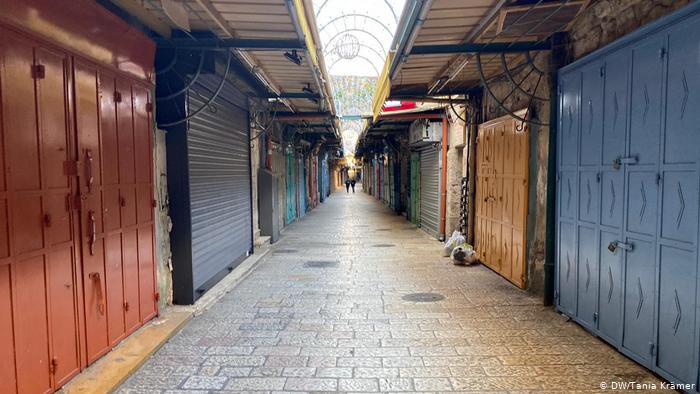A taxi pulls up to the Shaar Hashamayim Synagogue on Adly Street in downtown Cairo. The driver has to wait for the manic traffic to calm down before he can unload a wheelchair from his trunk, unfold it, and help a frail, elderly woman into its seat.
The occasion is the Jewish holiday of Passover, and the woman is one the few remaining Egyptian Jews. The driver wheels the woman past some 20 security guards stationed in front of the synagogue. Entrants, with some exceptions, need to be on a list before being allowed into the seder, the ritual dinner that celebrates the holiday. According to two of the seder’s opening lines: “All who are hungry, let them enter and eat. All who are in need, let them come celebrate Passover with us.” But here, security concerns appear to take precedence.
The seder is held in a multipurpose room adjacent to the synagogue’s impressive, high-walled central courtyard. Almost all of the Egyptian Jews present are elderly women, sitting at two small, round tables at the back of the room. A long, white-clothed table runs down the center, at the head of which sits Rabbi Mark El Fassi, the president of Les Enfants d’Abraham (the Children of Abraham) organization in France, who has been imported to lead the seder.
Fassi conducts a short and not overtly religious service, reciting only a few Hebrew prayers — which at one point compete with the Arabic call to prayer echoing through the downtown streets outside. He cycles through Arabic, Hebrew, French and English in an attempt to accommodate the language capabilities of everyone in the room. He tells a few jokes. The food is plentiful and the conversation friendly. And there is wine.
The primary force behind this seder, and the continued relevance of Egypt’s Jewish community, is the woman seated to Fassi’s left, Carmen Weinstein. As president of the Egyptian Jewish community, Weinstein has presided over the restoration of the Bassatine Cemetery — the second oldest Jewish cemetery in the world — and the synagogue at which the seder is held, among other projects. She maintains a website, Bassatine News, which bills itself as “the ONLY Jewish newsletter reporting directly from Egypt.” That United States Ambassador to Egypt Anne Patterson attends the seder is a further testament to Weinstein’s clout.
But Weinstein’s efforts have only put off an inevitable reality: Egypt’s Jewish community — some 80,000 strong in the early twentieth century and now consisting of a few dozen elderly women — is dying out.
“There’s not much of a community,” says Joel Beinin, a professor of Middle East history at Stanford University who wrote “The Dispersion of Egyptian Jewry.” “I mean we’re talking about a few people here.”
Israel declared itself a sovereign state in 1948, immediately setting off a war with neighboring Arab states, including Egypt. In the middle of that year in Egypt, bombs and rioting in Cairo’s Jewish neighborhoods left 70 Egyptian Jews killed and hundreds wounded. The situation worsened during the 1956 Suez Crisis, when Israel, France and Great Britain attacked Egypt after former President Gamal Abdel Nasser nationalized the Suez Canal. As Beinin puts it in his book, “Between 1919 and 1956, the entire Egyptian Jewish community … was transformed from a national asset into a fifth column.” Most of Egypt’s remaining Jews left after the 1967 Arab-Israeli War.
Isaac Cohen, a Jew born in Cairo who now lives in Chicago, was attending university in Montpellier, France in 1956 when he learned that war had broken out back home.
“I didn’t know whether my parents were dead or alive. France was an enemy country for Egypt so there were no communications,” he recalls. “And I was scared to death. Then one day I got a mail from Italy that they had left and they were expelled.”
Cohen, a retired professor of cell and molecular biology at Northwestern University, says in a phone interview: “It is important for Egyptians to know about the population of Egypt that practically disappeared from Egypt. After all, this is part of their heritage.”
Despite what happened to his family, Cohen betrays no ill-will toward the country of his birth. “I had a beautiful life, a beautiful youth in Egypt,” he says.
On the guestbook of the website Historical Society of Jews from Egypt, other expatriate Egyptian Jews like Cohen can be found trying to reconnect with their homeland. Egyptian Jews living in Mexico City, Malta, Bristol, Montreal, New York and Jerusalem, to name a few places, post messages in hopes of finding long-lost friends, trading memories and telling personal stories of when (almost all in the 1950s and 60s) and under what conditions they left.
While few of the posts seem bitter at the Egypt of today, some do hint at lingering resentment over the treatment of Egyptian Jews under the 1952 military regime. “Egypt was a beautiful country before 1952,” writes one poster.
Other websites and organizations run by expatriate Egyptian Jews, such as Jews Indigenous to the Middle East and North Africa (JIMENA), Justice for Jews from Arab Countries, Harif (Association of Jews from the Middle East and North Africa) and the blog “Point of no return,” aggressively highlight what they describe as a history of Jewish persecution in the region. The sites exhaustively compile media stories and other reports documenting Jewish expulsions and continued expressions of anti-Semitism. They emphasize that Middle Eastern and North African Jews were made refugees, often hinting that Palestinian refugees have been given disproportionately more attention than Jewish ones.
The JIMENA mission statement reads, in part:
“JIMENA seeks to address the existing gap in the historical narrative of the Middle East and North Africa by sharing the Mizrahi and Sephardi story of oppression, plight and displacement.”
Joseph Wahed, JIMENA’s founder and an Egyptian Jew, says Egypt’s Jews were “all ethnically cleansed between 1948 and 1970.” Wahed and many expatriate Egyptian Jews, in their focus on preserving the past, want the Jewish antiquities that remain in Egypt to be moved to the United States, but have been met with resistance by both Weinstein and the Egyptian government.
“The government is a major obstacle because it considers these as ‘Egyptian Antiquities’ and belonging to Egypt. The Egyptians will do anything to hurt us,” he writes in an email message.
The voices of the remaining Egyptian Jews remain silent on the issue of their dwindling community. Despite this journalist’s repeated attempts to contact members of the community, all refused to speak on or even off the record.
Speaking in a telephone interview, Beinin says that the community today has found itself in a complicated position, which is why its members are reluctant to speak to the media.
“There’s nothing they can say that can be safe for them,” he says. “They are under the intense scrutiny of the Egyptian government and Egyptian intelligentsia. They themselves are not Zionists, that’s why they’re still in Egypt. But they’re not sufficiently anti-Israel for some Egyptian intellectuals.”
Despite the difficulties inherent to the task, Weinstein appears set on maintaining the Egyptian Jewish community. She declined to be interviewed for this story.
“There is a very long history of Jewish life in Egypt; it goes all the way back to Abraham and Joseph, and permanent settlement as old as Jeremiah,” says Beinin. “So if someone is actually thinking about the past and future of this community, you don’t so easily say it’s done.”
Cohen has recently seen some encouraging signs. He says he is inspired by Egypt’s young generation, which not only toppled dictatorial President Hosni Mubarak but has also gone on to question state-propagated narratives about the country’s history. Cohen says that through Facebook, he has been able to connect with a few young Egyptians who are interested in the history of the country’s indigenous Jewish community, though he says most are afraid to speak about it publicly.
Cohen says he may return to Cairo for a visit next spring to meet these young Egyptians in person. He hasn’t been here for over 50 years.
“The light at the end of the tunnel are my new friends in Egypt,” he says. “I consider them as heroes. I want to visit Cairo, the land of my birth, and I want to honor them.”
*Correction: This article previously stated that Isaac Cohen was obtaining his PhD in Paris, France when the Suez Crisis broke out. It has been corrected to say that he was attending university in Montpellier, France.




